Christoph Redl
Inlining External Sources in Answer Set Programs
Aug 02, 2018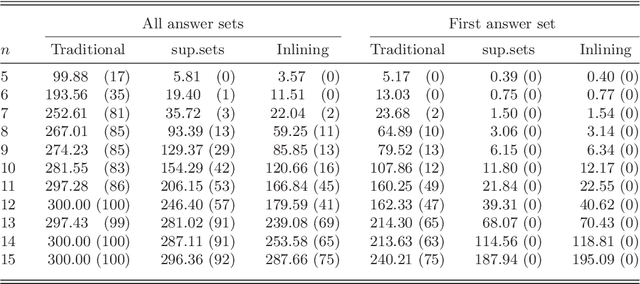

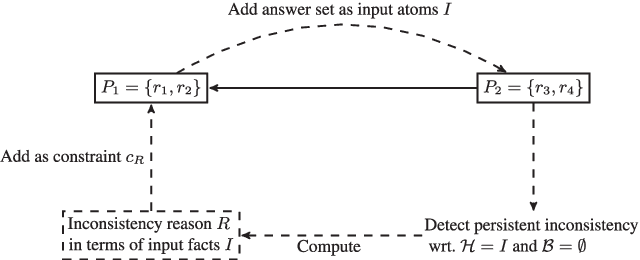
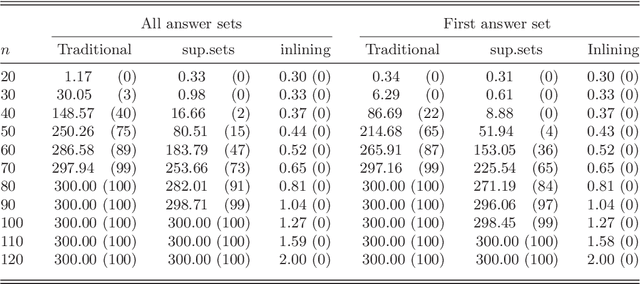
Abstract:HEX-programs are an extension of answer set programs (ASP) with external sources. To this end, external atoms provide a bidirectional interface between the program and an external source. The traditional evaluation algorithm for HEX-programs is based on guessing truth values of external atoms and verifying them by explicit calls of the external source. The approach was optimized by techniques that reduce the number of necessary verification calls or speed them up, but the remaining external calls are still expensive. In this paper we present an alternative evaluation approach based on inlining of external atoms, motivated by existing but less general approaches for specialized formalisms such as DL-programs. External atoms are then compiled away such that no verification calls are necessary. The approach is implemented in the dlvhex reasoner. Experiments show a significant performance gain. Besides performance improvements, we further exploit inlining for extending previous (semantic) characterizations of program equivalence from ASP to HEX-programs, including those of strong equivalence, uniform equivalence and H, B -equivalence. Finally, based on these equivalence criteria, we characterize also inconsistency of programs wrt. extensions. Since well-known ASP extensions (such as constraint ASP) are special cases of HEX, the results are interesting beyond the particular formalism. Under consideration in Theory and Practice of Logic Programming (TPLP).
Technical Report: Inconsistency in Answer Set Programs and Extensions
May 31, 2018


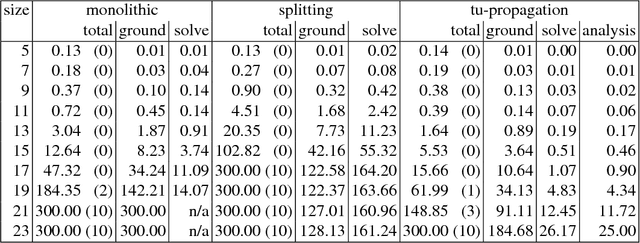
Abstract:Answer Set Programming (ASP) is a well-known problem solving approach based on nonmonotonic logic programs. HEX-programs extend ASP with external atoms for accessing arbitrary external information, which can introduce values that do not appear in the input program. In this work we consider inconsistent ASP- and HEX-programs, i.e., programs without answer sets. We study characterizations of inconsistency, introduce a novel notion for explaining inconsistencies in terms of input facts, analyze the complexity of reasoning tasks in context of inconsistency analysis, and present techniques for computing inconsistency reasons. This theoretical work is motivated by two concrete applications, which we also present. The first one is the new modeling technique of query answering over subprograms as a convenient alternative to the well-known saturation technique. The second application is a new evaluation algorithm for HEX-programs based on conflict-driven learning for programs with multiple components: while for certain program classes previous techniques suffer an evaluation bottleneck, the new approach shows significant, potentially exponential speedup in our experiments. Since well-known ASP extensions such as constraint ASP and DL-programs correspond to special cases of HEX, all presented results are interesting beyond the specific formalism.
The DLVHEX System for Knowledge Representation: Recent Advances (System Description)
Aug 02, 2016
Abstract:The DLVHEX system implements the HEX-semantics, which integrates answer set programming (ASP) with arbitrary external sources. Since its first release ten years ago, significant advancements were achieved. Most importantly, the exploitation of properties of external sources led to efficiency improvements and flexibility enhancements of the language, and technical improvements on the system side increased user's convenience. In this paper, we present the current status of the system and point out the most important recent enhancements over early versions. While existing literature focuses on theoretical aspects and specific components, a bird's eye view of the overall system is missing. In order to promote the system for real-world applications, we further present applications which were already successfully realized on top of DLVHEX. This paper is under consideration for acceptance in Theory and Practice of Logic Programming.
A model building framework for Answer Set Programming with external computations
Jul 11, 2015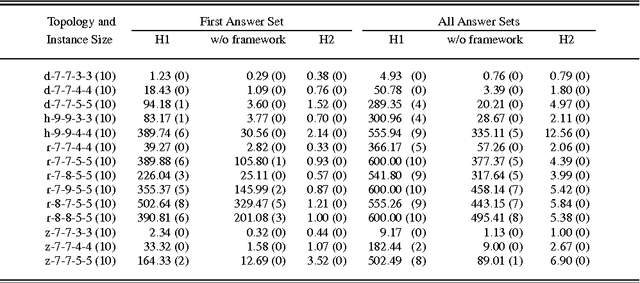
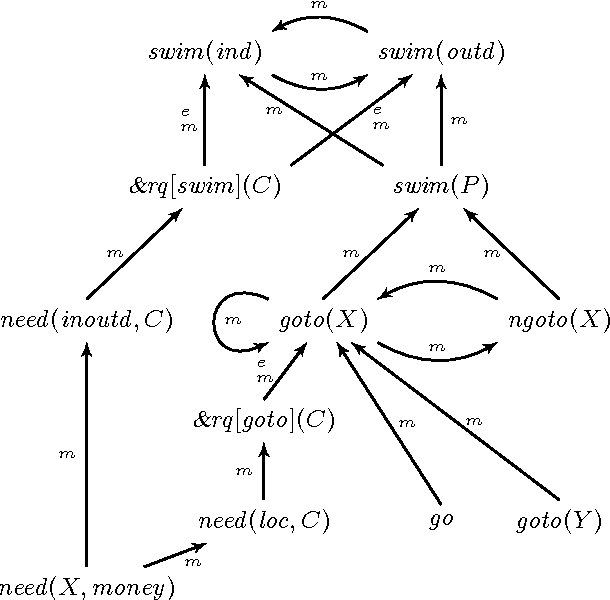
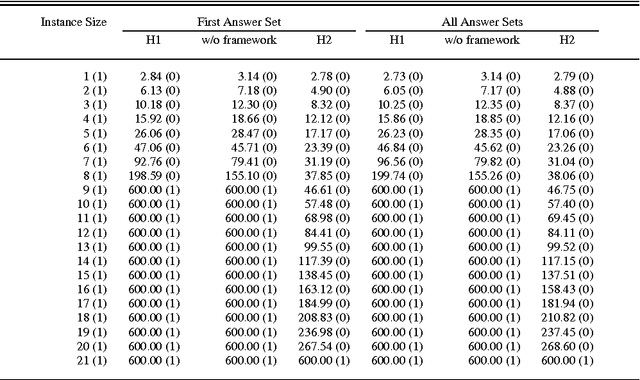
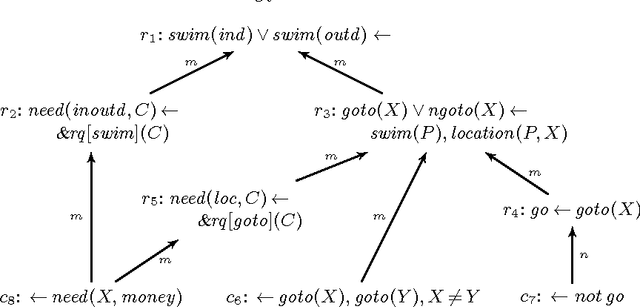
Abstract:As software systems are getting increasingly connected, there is a need for equipping nonmonotonic logic programs with access to external sources that are possibly remote and may contain information in heterogeneous formats. To cater for this need, HEX programs were designed as a generalization of answer set programs with an API style interface that allows to access arbitrary external sources, providing great flexibility. Efficient evaluation of such programs however is challenging, and it requires to interleave external computation and model building; to decide when to switch between these tasks is difficult, and existing approaches have limited scalability in many real-world application scenarios. We present a new approach for the evaluation of logic programs with external source access, which is based on a configurable framework for dividing the non-ground program into possibly overlapping smaller parts called evaluation units. The latter will be processed by interleaving external evaluation and model building using an evaluation graph and a model graph, respectively, and by combining intermediate results. Experiments with our prototype implementation show a significant improvement compared to previous approaches. While designed for HEX-programs, the new evaluation approach may be deployed to related rule-based formalisms as well.
* 57 pages, 9 figures, 3 tables, 6 algorithms, to appear in Theory and Practice of Logic Programming (accepted in June 2015)
Eliminating Unfounded Set Checking for HEX-Programs
Jan 08, 2013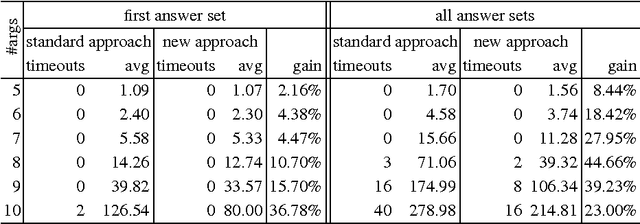
Abstract:HEX-programs are an extension of the Answer Set Programming (ASP) paradigm incorporating external means of computation into the declarative programming language through so-called external atoms. Their semantics is defined in terms of minimal models of the Faber-Leone-Pfeifer (FLP) reduct. Developing native solvers for HEX-programs based on an appropriate notion of unfounded sets has been subject to recent research for reasons of efficiency. Although this has lead to an improvement over naive minimality checking using the FLP reduct, testing for foundedness remains a computationally expensive task. In this work we improve on HEX-program evaluation in this respect by identifying a syntactic class of programs, that can be efficiently recognized and allows to entirely skip the foundedness check. Moreover, we develop criteria for decomposing a program into components, such that the search for unfounded sets can be restricted. Observing that our results apply to many HEX-program applications provides analytic evidence for the significance and effectiveness of our approach, which is complemented by a brief discussion of preliminary experimental validation.
Conflict-driven ASP Solving with External Sources
Oct 05, 2012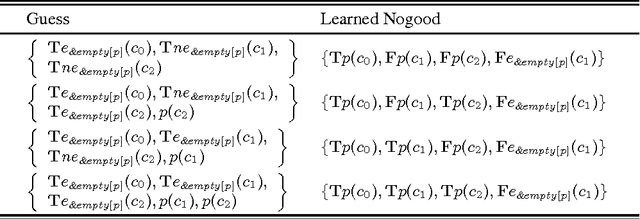

Abstract:Answer Set Programming (ASP) is a well-known problem solving approach based on nonmonotonic logic programs and efficient solvers. To enable access to external information, HEX-programs extend programs with external atoms, which allow for a bidirectional communication between the logic program and external sources of computation (e.g., description logic reasoners and Web resources). Current solvers evaluate HEX-programs by a translation to ASP itself, in which values of external atoms are guessed and verified after the ordinary answer set computation. This elegant approach does not scale with the number of external accesses in general, in particular in presence of nondeterminism (which is instrumental for ASP). In this paper, we present a novel, native algorithm for evaluating HEX-programs which uses learning techniques. In particular, we extend conflict-driven ASP solving techniques, which prevent the solver from running into the same conflict again, from ordinary to HEX-programs. We show how to gain additional knowledge from external source evaluations and how to use it in a conflict-driven algorithm. We first target the uninformed case, i.e., when we have no extra information on external sources, and then extend our approach to the case where additional meta-information is available. Experiments show that learning from external sources can significantly decrease both the runtime and the number of considered candidate compatible sets.
* To appear in Theory and Practice of Logic Programming
Nested HEX-Programs
Aug 29, 2011
Abstract:Answer-Set Programming (ASP) is an established declarative programming paradigm. However, classical ASP lacks subprogram calls as in procedural programming, and access to external computations (like remote procedure calls) in general. The feature is desired for increasing modularity and---assuming proper access in place---(meta-)reasoning over subprogram results. While HEX-programs extend classical ASP with external source access, they do not support calls of (sub-)programs upfront. We present nested HEX-programs, which extend HEX-programs to serve the desired feature, in a user-friendly manner. Notably, the answer sets of called sub-programs can be individually accessed. This is particularly useful for applications that need to reason over answer sets like belief set merging, user-defined aggregate functions, or preferences of answer sets.
 Add to Chrome
Add to Chrome Add to Firefox
Add to Firefox Add to Edge
Add to Edge